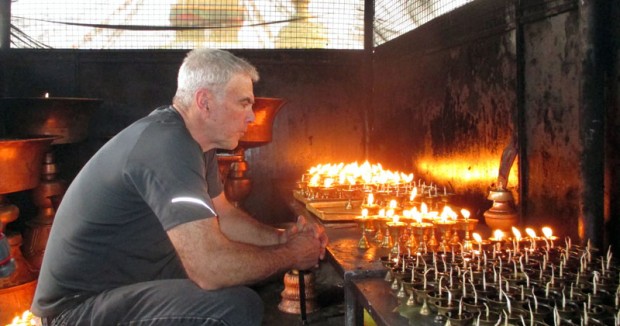
Since I returned to Sacramento the end of April I have had the opportunity to speak to several groups and a number of 8th grade classes. I have also been interviewed on two radio stations. What a wonderful privilege. All of these opportunities have given me time to reflect on my experiences in the Khumbu as well as my transition here at home. My time is filled now with uncertainty about the future, the “gap” as Beth Ruyak from NPR called it, but it is turning out to be a blessing in disguise. I have time to just be with everything that happened, and is happening. I can work out at the gym now because I want to and not because I “have” to. I can ride my bike and not be consumed with keeping a certain pace. I am having fun. I can go on a walk/hike and leave my 65# pack at home. I like that. I have a few mountains that I want to climb in my future – Lassen in June, Whitney in September, and Fuji next year. But I am approaching them with anticipation and not because they are part of a training regimen. It is such a nice place to be.
I have also been sifting through all the things that happened while on the Everest expedition and have found some things that I can take with me, not just for future climbs, but for living life. I found things connected with my preparation, the Sherpa, my family, and my higher power that may not be profound, but that are definitely lessons that represent an important way to approach experiences in life that leave us with an appreciation for them rather than resentment. I am sure there are still lessons that have yet to be revealed, but here are the ones that have already shown up and engaged me:
1. By failing to prepare you prepare to fail.
This is a quote from Ben Franklin that I first came across in 2008 as I was preparing for Denali. It served me well then and it became extremely important for Everest. I did everything possible to be prepared for Everest. Even though my team had to turn around I came back with no regrets because there was nothing else I could have done to be ready to climb. Of course there would be things I would do differently if there is ever another chance. It is what we call experience.
2. Our Higher Power is in charge not us.
We may think we have control, but we really don’t. I found that the more I would let go of this thing we call control the more peace would come into my life and the more ease I would experience every day. I didn’t have to struggle up the mountain.
3. Loving others is a very high priority.
After God and self (not in an ego way, but a caretaking way) our highest priority is to love others. This means putting others’ needs before our own. They in turn put our needs first. Wouldn’t that be cool. After the avalanche my first thoughts were for the Sherpa, and my family and friends. And in return I felt all of their love coming back to me.
4. Having a goal is good, but don’t go “all in” on it.
I went to Everest with the sole intent of getting to the top to become the oldest American to climb Everest. After the avalanche that goal was insignificant. It was “snuffed” out and the Sherpa and safety became the priority. Had my ego been consumed with the goal of getting to the top I would likely have become “devastated” by the loss of this goal. Not a wise choice since the outcome was totally out of my control. The better choice was to shift my thinking to something more meaningful and relevant to me, my family and friends, and of course the Sherpa.
5. Life requires an incredible amount of patience.
One of the biggest lessons on Everest was this one. We grow up wanting what we want when we want it. If we don’t get it right away we get upset, angry, or frustrated, or a combination of all three. I’m sure you have experienced it. But what was the first lesson from Everest – the universe is in charge not us. And the universe has its own timing and is often out of sync from our timing. Ever notice that? So the big lesson here is to work diligently at developing a lot of patience. Life will become so much easier.
6. Trust in your higher power, not in things and not in yourself.
This has always been a tough one for me because I did life by myself most of the time. I couldn’t, or didn’t, rely on others. I became very independent and adopted a “I can do it myself” attitude. It served me well for a while. You probably know what I mean. But eventually life became a struggle because it wasn’t working for me any longer. So what did I do? I started listening to this inner voice and complying with “instruction.” And life started working, especially on this Everest climb. In the midst of all the every-day “chaos” I followed the internal “instruction” and was able to find peace in trusting that all was well regardless of what I was wanting things to be.
There was one last lesson that I want to share. I have heard it before and you may have too, but I really didn’t understand the magnitude of the implications. Here it is: “You can love the mountain, but it doesn’t love you back. It could care less if you are even there.”
